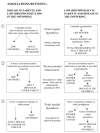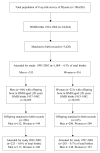Relationships of maternal and paternal birthweights to features of the metabolic syndrome in adult offspring: an inter-generational study in South India
- PMID: 17143606
- PMCID: PMC2493388
- DOI: 10.1007/s00125-006-0516-9
Relationships of maternal and paternal birthweights to features of the metabolic syndrome in adult offspring: an inter-generational study in South India
Abstract
Aims/hypothesis: The association between lower birthweight and metabolic syndrome may result from fetal undernutrition (fetal programming hypothesis) and/or genes causing both low birthweight and insulin resistance (fetal insulin hypothesis). We studied associations between the birthweight of parents and metabolic syndrome in the offspring.
Methods: We identified men and women (aged 35-68 years), who had been born in Holdsworth Memorial Hospital, Mysore, India. We also identified the offspring (20-46 years) of these men and women. In total, 283 offspring of 193 mothers and 223 offspring of 144 fathers were studied. Investigations included anthropometry, oral glucose tolerance, plasma insulin and lipid concentrations and blood pressure. The metabolic syndrome was defined using WHO criteria.
Results: Among the offspring, lower birthweight was associated with an increased risk of glucose intolerance (impaired glucose tolerance, impaired fasting glucose or type 2 diabetes) and higher cholesterol and triacylglycerol concentrations (p < 0.05 for all adjusted for sex and age). Most outcomes in the offspring, including most individual components of the metabolic syndrome, were unrelated to parental birthweight. However, both maternal and paternal birthweight were inversely related to offspring metabolic syndrome (odds ratio [OR] 0.36 [95% CI: 0.13-1.01] per kg, p = 0.053 for mother-offspring pairs; OR 0.26 [0.07-0.93], p = 0.04 for father-offspring pairs, adjusted for offspring age, sex, BMI and socioeconomic status). Maternal birthweight was inversely related to offspring systolic blood pressure (beta = -2.5 mmHg [-5.00 to 0.03] per kg maternal birthweight; p = 0.052).
Conclusions/interpretation: Factors in both parents may influence the risk of metabolic syndrome in their offspring. There are several possible explanations, but the findings are consistent with the fetal insulin (genetic) hypothesis.
Figures


Similar articles
-
Intergenerational effects on size at birth in South India.Paediatr Perinat Epidemiol. 2004 Sep;18(5):361-70. doi: 10.1111/j.1365-3016.2004.00579.x. Paediatr Perinat Epidemiol. 2004. PMID: 15367323
-
Maternal fetal programming of birthweight among Australian Aboriginal infants: a population-based data linkage study.Lancet Glob Health. 2019 Apr;7(4):e523-e532. doi: 10.1016/S2214-109X(18)30561-8. Epub 2019 Feb 21. Lancet Glob Health. 2019. PMID: 30799143
-
Metabolic syndrome in childhood: association with birth weight, maternal obesity, and gestational diabetes mellitus.Pediatrics. 2005 Mar;115(3):e290-6. doi: 10.1542/peds.2004-1808. Pediatrics. 2005. PMID: 15741354
-
Cardiometabolic health in offspring of women with PCOS compared to healthy controls: a systematic review and individual participant data meta-analysis.Hum Reprod Update. 2020 Jan 1;26(1):103-117. doi: 10.1093/humupd/dmz036. Hum Reprod Update. 2020. PMID: 31867675 Free PMC article.
-
Glucocorticoid excess and the developmental origins of disease: two decades of testing the hypothesis--2012 Curt Richter Award Winner.Psychoneuroendocrinology. 2013 Jan;38(1):1-11. doi: 10.1016/j.psyneuen.2012.08.012. Epub 2012 Sep 19. Psychoneuroendocrinology. 2013. PMID: 22998948 Review.
Cited by
-
Cohort Profile: The 1934-66 Mysore Birth Records Cohort in South India.Int J Epidemiol. 2015 Dec;44(6):1833-41. doi: 10.1093/ije/dyv176. Epub 2015 Oct 7. Int J Epidemiol. 2015. PMID: 26445965 Free PMC article. No abstract available.
-
Investigation of Genetic Variation Underlying Central Obesity amongst South Asians.PLoS One. 2016 May 19;11(5):e0155478. doi: 10.1371/journal.pone.0155478. eCollection 2016. PLoS One. 2016. PMID: 27195708 Free PMC article.
-
Maternal and neonatal outcomes for pregnancies before and after gastric bypass surgery.Int J Obes (Lond). 2015 Apr;39(4):686-94. doi: 10.1038/ijo.2015.9. Epub 2015 Feb 3. Int J Obes (Lond). 2015. PMID: 25644056 Free PMC article.
-
Paternal metabolic and cardiovascular programming of their offspring: A systematic scoping review.PLoS One. 2020 Dec 31;15(12):e0244826. doi: 10.1371/journal.pone.0244826. eCollection 2020. PLoS One. 2020. PMID: 33382823 Free PMC article.
-
IFSO-APC consensus statements 2011.Obes Surg. 2012 May;22(5):677-84. doi: 10.1007/s11695-012-0610-7. Obes Surg. 2012. PMID: 22367008
References
-
- Barker DJP. Mothers, babies and health in later life. London: Churchill Livingstone; 1998.
-
- Barker DJP, Hales CN, Fall CHD, Osmond C, Phipps K, Clark PMS. Type II (non-insulin-dependent) diabetes mellitus, hypertension and hyperlipidaemia (syndrome X): relation to fetal growth. Diabetologia. 1993;36:62–67. - PubMed
-
- Hattersley AT, Tooke JE. The fetal insulin hypothesis: an alternative explanation of the association of low birthweight with diabetes and vascular disease. Lancet. 1999;353:1789–92. - PubMed
-
- Lindsay RS, Dabelea D, Roumain J, Hanson RL, Bennett PH, Knowler WC. Type 2 diabetes and low birthweight. The role of paternal inheritance in the association of low birthweight and diabetes. Diabetes. 2000;49:445–449. - PubMed
Publication types
MeSH terms
Grants and funding
- G0400519(71108)/MRC_/Medical Research Council/United Kingdom
- MC_U147574246/MRC_/Medical Research Council/United Kingdom
- U.1475.00.004.00005.01 (85821)/MRC_/Medical Research Council/United Kingdom
- U.1475.00.004.00005.01(74246)/MRC_/Medical Research Council/United Kingdom
- G0400519/MRC_/Medical Research Council/United Kingdom
LinkOut - more resources
Full Text Sources
Medical

